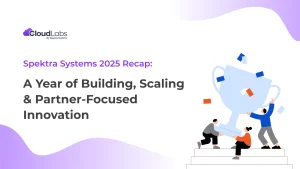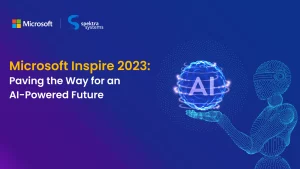Business success comes from increased sales and an improved revenue stream. Your customer should be the focus of all your sales and marketing campaigns. When you understand what drives the purchase decisions of your buyers, you can align your marketing efforts in line with consumer behavior. With the changing market conditions, the buyer’s intent and motivation are constantly in flux. As a CSP business, if you are able to capitalize on these changing buyer behavioral patterns by aligning your marketing and sales efforts, you are in the right direction.
The behavioral signs and patterns that can predict whether someone has the intention of purchasing a product or a service constitute buyer intent. As people browse the web, be it online searches, social media browsing, clicks on product ads, downloading reports, booking a demo, reading blogs and articles, or any kind of online activity, they leave digital footprints. These behavioral signals can be collected and analyzed to understand the intent of a prospect. The patterns can then help you in planning, customizing, and changing your messaging to remain relevant to customer expectations.
Through the course of this research paper, we seek to help you understand, how as a CSP, you can leverage buyer intent to align your sales and marketing efforts to drive business success, by focusing on:
● Different types of data to understand buyer intent
● Benefits of using buyer intent data for your business
● Top 8 ways to use cloud buyer intent to drive Microsoft CSP business
Different types of data to understand buyer intent
Depending upon the source of data collection, intent data can be broadly classified into:
1. Internal intent data
Internal intent data or first-party data is the intent data that your CSP business collects in-house. These can be collected from your website logs, mobile app, CRM, or any marketing automation platform you use. This data is available to you immediately and you have complete control over what you collect and how you use it. First-party data is more accurate as compared to data acquired externally.
2. External intent data
External intent data is also known as third-party data. It is the data that is not primarily collected by you or your resources. This included data collected by review websites, surveys, blog sites, social media platforms, or any other websites or platforms. You can purchase this data from external data providers and use it to boost your business. External intent data is collected using cookies and IP lookups and gives a more holistic view of the buyers’ journey. This type of data is sold by both companies that collect data themselves as well as aggregators that collect and resell data from varied sources.
Making use of a combination of both these types of data will give you the best results to align your sales and marketing efforts to facilitate CSP business expansion and revenue growth.
Benefits of using buyer intent data for your business
Before jumping onto decoding how you can leverage the buyer intent data collected through various sources, it is important to understand the role undertaking this exercise will play in helping you get closer to CSP business success. Understanding the cloud buyer intent can enable you to:
1. Identify leads earlier than the competition
Collecting and using buyer intent data gives you a chance of reaching out to potential customers who require CSP solutions way before your competition. This gives you the first mover advantage of having a large target audience for you to pitch your product.
2. Focus on high probability leads
The customers who are actively looking for a solution to a problem have a higher rate of conversion. Having access to such buyer intent data can help you classify them as hot leads and use more resources to pursue them. These customers have already acknowledged their problem which greatly reduces the time taken by them to make a purchase decision. The reduced length of the sales lifecycle helps you save time and accelerate revenue realization.
3. Upsell to existing customers
You might have a steady business from your existing customer base, but there is always an opportunity to sell more to an existing buyer. When you have insights about the existing customers especially around what solutions they are looking for, you can target them to upsell products. This increases the customer lifetime value. These insights can also help you in retaining customers as you will be better informed of their pain points and can address them before they move to a competitor.
4. Predict future sales
Tracking the buyer intent can help you assess the demand for your product. The higher the number of people or companies looking for a solution like yours, the more are the chances of increased sales in the future. On the other hand, if the intent data shows low interest in your solution, you can research more and improvise your solution to address industry-specific problems with new CSP solutions.
Top 8 ways to use cloud buyer intent to drive Microsoft CSP business
Based on our experience of working with CSPs across the globe, we have identified 8 major ways in which CSP businesses can leverage cloud buyer intent to drive business growth and expansion.
1. Understand customer behavior
The behavior of buyers has undergone a lot of change in the last few years. The way the customers approach products and services are quite different from say a decade back. The customers are no longer dependent on a sales executive to get the information they need on a product or a service. They can simply go online, download the brochure, read reviews, and compare different products by themselves.
As a CSP, tracking and analyzing customer behavior can help you understand what influences your customers’ decisions. It can help you decide how to best market your product to prospective buyers to create the maximum impact. Understanding the rapidly evolving customer behavior is the key to any successful marketing campaign. Customer behavior can be influenced by marketing campaigns, business needs, personal preferences, economic conditions, etc.
2. Find your ideal customer
Leveraging big data technology can help you find your ideal customer. Collect large amounts of actionable data such as views, searches, registrations, page clicks, shares, etc. These can be used to analyze the interest of the customers. This greatly reduces the time and effort spent in guessing who your ideal customer is and leads to more profit. You can use the intent data to predict where exactly the customer is in the sales life cycle and the probability of lead conversion.
As a CSP, you can use these insights to send marketing messages which are suitable for that stage of the buyer’s journey. This can help move a prospective buyer further along the sales cycle. Furthermore, you can take advantage of the data to identify which products and services to offer to which type of customer and whether single products or bundled offerings would receive a better response. Cloud buyer intent can also help in deciding the pricing and promotions to be offered to different customers.
3. Redefine your content strategy
When marketing your products to prospective customers, talk about their business problems and the solutions you can offer. Just listing down the product specifications and technology will not be enough. You need to shift your sales pitch from features and specifications to challenges and solutions. Tell your customers how your product is better aligned to their business needs, how your product benefits them in terms of return on investment.
There is a high chance that any intention to buy is due to an event or a problem that occurs in the business. This is the pre-intent moment, this is when your buyer has the first thought about buying a product or a service. If you can recognize such potential buyers, you can create content around pre-intent and drive these buyers to your website.
The language, tone, vocabulary have to be modified to connect with the decision-makers. Earlier the decision-makers for technology-related projects and solutions were solely the IT people. There has been an increasing shift towards people in sales, marketing, finance, etc. getting involved in the decision-making process. This makes it crucial to address all the decision-makers from different backgrounds.
4. Tap into new markets
To scale you need to expand globally, target new regions, and not limit yourself geographically. How can understanding buyer intent data help you expand?
You might have built a top-notch industry-specific solution and all your customers could be businesses located nearby. But there can be other businesses in the same industry looking for the same solution. These can be spread all over the globe and not just limited to your state or country. You can make use of intent data to see when a company shows interest in purchasing your solution or something similar.
Similarly, a business from a different field that you are currently catering to might be interested in your product. Vastly different industries can also have a few common business pain points that your solution might be able to address. When such a business visits your website, books a demo, or displays any other behavioral signal you can analyze their intent and tag them as a prospective buyer. Without this information, the chances of you approaching these industries would have been slim. Thus, you can use intent data to expand your target customer base across different industries as well as geographies. Some of these markets might have previously been untapped and give you a chance of pitching in a less competitive space. Lack of competition can translate into better margins and higher wins for you.
5. Use automation in marketing
You need to integrate automation and machine learning into your marketing strategy. By use of machine learning, you can identify and understand customer behavior patterns. This can then be used to predict customer intent. Using automation, you can reduce the time spent on repetitive tasks, minimize errors and generate better leads. Automation increases efficiency and reduces costs. It also helps in shortening the sales cycle lifecycle by personalizing the customer experience. Increased customer satisfaction leads to a higher customer lifetime value.
The use of different types of data analytics like descriptive, predictive, diagnostic, and prescriptive can help you forecast the outcomes of your marketing campaigns. Based on the predictions, you can work on improving the efficiency of your campaigns. Machine learning can also help you in creating personalized content for different sets of audiences. Marketing messages and emails can be automatically optimized. A positive user experience will make your website content rank higher. Machine learning can assist you with optimizing the content of your website. It can also assist in suggesting better meta descriptions, headers, and tags for your website. With the correct automation strategy, you can automate even the most complex tasks, boost sales, and improve customer retention.
6. Engage with customers
Customer engagement leads to customer loyalty. You can use different ways to connect and engage with current and prospective buyers. You can make use of your social media profiles and pages, e-mails, company website, feedback forms to communicate with your customers. Doing so will serve the dual purpose of establishing a relationship with your customer with two-way communication as well as providing you with useful data to gauge the value of your business. This data can then be used to decide how to proceed in pursuing different leads. It will allow you to sell to both new customers as well as upsell to existing ones.
Customer engagement not only helps you know what your customers are thinking but also helps you build trust. When customers see you listening to them and improving your services as per their needs, they seek you first instead of reaching out to a competitor whenever they are in the market to buy. This will lower your sales costs as customer retention is cheaper than customer acquisition.
7. Focus on educating not just selling
A large number of companies that are in the market to buy products and solutions have some degree of understanding of how technology can solve their problems. At times the prospect is looking for more knowledge before they start narrowing down their choices. Collecting and analyzing behavioral signals such as downloading research reports, white papers, or any other solution focused content can help you target such buyers.
You can approach them by giving them more information on your solution, educating them about your product. Instead of simply stating how good or advanced your technology is, talk to them about why they need a technology change and how different features can help them solve business problems. When you reach out to them don’t assume the role of a salesperson, instead act like a consultant, who with industry expertise can educate and help them in their business.
8. Differentiate yourself
Differentiating yourself will give you a competitive advantage over other CSP providers.
As buyer intent data can help you dive deep into the pain points a prospective customer might be facing, you can score leads by providing them with tailor-made solutions. Apart from customizable solutions, you can differentiate yourself by using automation to simplify their purchase and billing journey, providing industry-specific expertise, having excellent customer support, and post-sales assistance.
When you understand the intent of the buyer, you can decide which differentiation factor to highlight while making your sales pitch. Some buyers might be in the market for more than one solution. Here is the opportunity for you to cross-sell and upsell by creating customized packaged bundles for them. You can also leverage the buyer intent data to sell your products as value add-ons along with Microsoft products. The higher margin on your products will help you increase your profit.
Address cloud buyer intent with CSP Control Center
It is important to note that simply understanding cloud buyer intent is not enough to drive success for your CSP business. You need to capitalize on the data and insights you capture to align all your efforts in the right direction. However, in such a situation, a partner like CSP Control Center or C3, can help you accelerate your success journey. With C3, you can:
● Provide cutting edge features and services to your customers, based on their changing expectations
● Offer complete autonomy and empower them with self-service capabilities
● Prevent revenue leakage due to missed/ error in invoices while you focus on converting insights into action
Invariably, there are several ways in which a collaboration with C3
can be your greatest move in staying relevant to the changing buying needs of
your customers. On a macro level, as all your administrative overheads get
taken care of in a more efficient and accurate manner, your team members have
the time and resources to focus on creating effective sales and marketing
campaigns that capitalize on cloud buyer intent. Book a demo today to
understand how C3 has been empowering and enabling CSPs across the world to
redefine their sales and marketing strategy to remain relevant, agile and
customer centric.
This blog was originally published on CSP Control Centre.



















